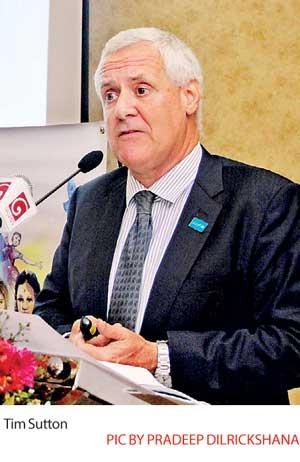21 Oct 2019 - {{hitsCtrl.values.hits}}
 The United Nations Children’s Fund (UNICEF) in Sri Lanka last week requested Sri Lanka’s presidential candidates to fully commit to resolve six critical issues faced by the six million child population to prepare the country for future-oriented, knowledge-based economy.
The United Nations Children’s Fund (UNICEF) in Sri Lanka last week requested Sri Lanka’s presidential candidates to fully commit to resolve six critical issues faced by the six million child population to prepare the country for future-oriented, knowledge-based economy.
The UNICEF last Friday launched a broad campaign titled ‘Ara Wade: A Vote for Children’ to persuade all presidential candidates to commit publicly to addressing the rights of children when they assume office.
The campaign aims to create awareness among Sri Lankan public of the six critical needs of children—ending child malnutrition forever, building an education system that prepares our young for the future, providing every child a fair chance to succeed by ending child poverty, banning of damaging physical punishment against children, creating an inclusive and peaceful Sri Lanka for all and fighting climate change and prepare Sri Lanka for its effects.
“We are asking each and every presidential candidate to commit to tackling these six critical issues. They have the power and the responsibility to endure action is taken.The children are the essence of the sustainability, because they are the future and they are also the present now,” UNICEF Sri Lanka Representative Tim Sutton said.
Despite the gains made by Sri Lanka after its historic commitment to protect and fulfil the rights of children by adopting the United Nations Convention on the Rights of the Child (CRC), he pointed out that the country still lags behind in several areas inhibiting children’s ability to reach their full potential.
“Nutrition is a fundamental building block in a child’s life and the cornerstone of that child’s development into a healthy and productive adult. Yet, Sri Lanka is one of the worst low and middle income countries in the world for ‘wasting’ (acute malnutrition) below Nepal, Bangladesh and Afghanistan.
Over 15 percent of Sri Lankan children under five suffer from wasting and 1 in 6 children experiences ‘stunting’ (severe malnutrition),” he noted.
Although, a Sri Lankan student spends more time in school than any other country in South Asia, statistics reveal that there are 11 percent student drop-outs between grade 5-9 while 80,000 students fail O/L exam and 70,250 students fail A/L exam.
Further, Sutton noted that 70 percent of Sri Lanka’s employers do not believe the general education system produces the skills required in the job market.
He emphasised that investments and reforms in education is crucial for Sri Lanka to become a future printed knowledge-based economy.
Sri Lanka currently invests less than 2 percent of its GDP annually on education, which is lower than most middle income countries.
“Getting investments into children is what is going to push this economy forward,” he stressed.
The UNICEF also urged the presidential candidates to take measures to ban corporal punishment, which is extremely damaging to the development of a child.
“Indisputable scientific evidence shows that corporal punishment is extremely damaging to the development of a child – physically, mentally and cognitively. Yet, it is still common and legal in homes, schools and communities across the country,” Sutton pointed out.
It has been revealed that 74 percent of parents use some form of corporal punishment on their children, according to a study conducted covering Galle, Polonnaruwa , Batticaloa and Colombo districts .
According to the National Child Protection Authority, 80.4 percent children have experienced at least one type of corporal punishment in the last term.
The UNICEF already sent the manifesto consisting of the six critical issues faced by children as well as the recommendations to all 35 presidential candidates, over one week ago.
Although, several political party representatives got back to the UNICEF, Sutton said that UNICEF is yet to secure an appointment for a brief meeting with any candidate as of last Friday.
(NF)
15 Nov 2024 6 minute ago
15 Nov 2024 33 minute ago
15 Nov 2024 1 hours ago
15 Nov 2024 1 hours ago
15 Nov 2024 2 hours ago